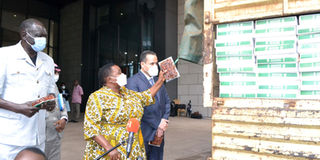Prime
Govt should revisit its policies on agriculture

Left to Right: Minister for Disaster Preparedness Hilary Onek, Prime Minister Robinah Nabbanja, and the Ambassador of Saudi Arabia to Uganda, Mr Jamal Mohammed Al-Madani, at the handover of the dates yesterday. PHOTO / SYLIVIA KATUSHABE
What you need to know:
The issue: Policies on agriculture.
Our view: The rains have so far been sporadic, which means a poor harvest from the first season of the year. That will mean more severe shortages, but should Uganda be experiencing food shortages simply because the rains did not come? Government must revisit its policies.
The media has in the last one week been awash with images of officials attached to the Office of the Prime Minister either receiving food donations or flagging off trucks of food destined for famine-ravaged Karamoja, where it is reported that 600 people died of starvation and close to 100,000 children and an estimated 10,000 pregnant women are in dire need of treatment for complications associated with malnutrition.
Now whereas government has since put in place a Shs135b response plan for Karamoja, the response time and packaging of that intervention clearly shows gaps in its response plan.
We are talking about a Ministry of Relief and Disaster Preparedness that does not seem to be prepared for any disasters.
It takes it days to make an intervention every time a disaster occurs! It never has an emergency fund or food supplies to turn to in case of an emergency.
It has never stored up on the usual things that are required whenever disasters of a certain nature occur. What happened to contingency planning?
What was required for Karamoja and indeed other regions where catastrophes of that nature occur is an integrated response that takes into consideration aspects such as the health and mental state of the victims.
A people who have been starving certainly require more than plates of beans and posho. Some will not be able to take water.
They require hospitalisation in order to be provided with therapeutic foods to enable them get back to their feet, but the Ministry of Health has not been visible here.
Some of the people there have been psychologically tortured by the goings on of the last several months, which means that they require a measure of psychosocial support, but the Ministry of Gender, Labour and Social Development has not been visible.
However, what happened in Karamoja calls for serious soul searching, especially around matters agriculture. Why, for example, was there no mechanism for foreseeing that acute shortages would hit the area?
The rains have so far been sporadic, which means a poor harvest from the first season of the year. That will mean more severe shortages, but should Uganda be experiencing food shortages simply because the rains did not come?
Should the agriculture of Uganda, a country endowed with so many water bodies, still be heavily dependent on rain water more than 25 years after we unveiled the plan for the modernisation of agriculture?
Government must revisit its policies on agriculture.
Our commitment to you
We pledge:
- To be accurate and fair in all we do.
- To be respectful to all in our pursuit of the truth.
- To refuse to accept any compensation beyond that provided by Monitor Publications Ltd. for what we do in our news gathering and decision-making.
Further, we ask that we be informed whenever you feel that we have fallen short in our attempt to keep these commitments.




